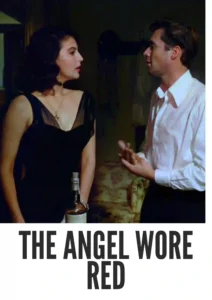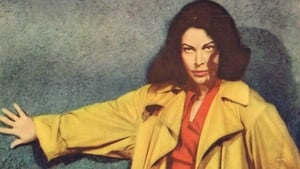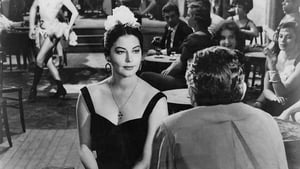Video Sources 0 Views

Synopsis

Immerse yourself in the tumultuous world of 1930s Spain with The Angel Wore Red, a powerful drama romance from 1960, now beautifully colorized for a captivating viewing experience. Starring Ava Gardner and Dirk Bogarde, this film explores themes of love, faith, and revolution against the backdrop of the Spanish Civil War. Perfect for fans of classic cinema and historical dramas, this HD download brings a visually stunning and emotionally resonant story to your screen.
The Angel Wore Red, also known as La Maja Desnuda in some regions, tells the story of Soledad (Ava Gardner), a cabaret singer with a fiery spirit and a complicated past. Set against the backdrop of the Spanish Civil War, Soledad finds herself caught between the warring factions, her life intertwined with that of an disillusioned priest named Arturo Carrera (Dirk Bogarde).
Arturo, grappling with his faith and the violence around him, abandons his calling and becomes embroiled in the revolutionary fervor. Soledad, initially cynical and world-weary, finds herself drawn to Arturo’s passion and idealism. Their relationship blossoms amidst the chaos and danger, as they navigate the complexities of love and loyalty in a time of war. As they become more involved with the conflict, they are tested in ways they never imagined. The film explores themes of redemption, sacrifice, and the enduring power of love in the face of adversity. The Angel Wore Red offers a poignant and thought-provoking look at a turbulent period in history, brought to life by compelling performances and a visually stunning backdrop.
The film boasts a stellar cast who deliver memorable performances:
-
Ava Gardner as Soledad
-
Dirk Bogarde as Arturo Carrera
-
Joseph Cotten as Hawthorne
-
Deirde McMahon as Mercedes
-
Enzo Fiermonte as General
The Angel Wore Red falls into the genre of drama romance, with elements of war and historical epic. Its exploration of complex characters and weighty themes sets it apart as a compelling and thought-provoking film.
Released in 1960, The Angel Wore Red provides a cinematic depiction of the Spanish Civil War, a conflict that deeply impacted Spain and Europe in the 1930s. The film offers a fictionalized account of the war, focusing on the human stories behind the political upheaval. While not a documentary, it captures the atmosphere of the time, with its themes of ideological conflict, social unrest, and the personal toll of war. The Angel Wore Red adds to a body of films that explore this significant historical event, each offering its unique perspective on the complexities and consequences of the conflict.
This colorized version of The Angel Wore Red has been meticulously restored, enhancing the visual impact while preserving the film’s emotional depth. The colorization process involved a careful and detailed analysis of the original black and white footage. Modern digital techniques were employed to bring out the richness and vibrancy of the Spanish landscapes and the characters’ costumes. The goal was to add a new dimension to the viewing experience, making the film more accessible and engaging for contemporary audiences. While debates about colorizing classic films continue, this version aims to honor the original artistic vision while introducing it to a new generation.
-
: Nunnally Johnson
-
: Nunnally Johnson, based on the novel by Elliot Paul
-
: Giuseppe Rotunno
-
: Stuart Gilmore
-
: Spectator Films
-
: Metro-Goldwyn-Mayer (MGM)
-
: 105 minutes
-
: MP4
-
: HD (1080p)
-
: Compatible with most devices, including smartphones, tablets, computers, and smart TVs.
The Angel Wore Red (1960) has been praised for its strong performances, particularly by Ava Gardner and Dirk Bogarde, and its exploration of complex themes. While some critics found the storyline somewhat melodramatic, the film’s visual beauty and emotional depth have been widely acknowledged. It remains a noteworthy example of a Hollywood film tackling the subject of the Spanish Civil War, offering a blend of romance, drama, and historical context.
-
: What is The Angel Wore Red about?
-
A: The Angel Wore Red is a drama romance set during the Spanish Civil War, focusing on the relationship between a cabaret singer and a disillusioned priest.
-
-
: Is The Angel Wore Red (1960) a well-known film?
-
A: While not a blockbuster, The Angel Wore Red is a respected film known for its performances and exploration of historical themes.
-
-
: Is this version of The Angel Wore Red colorized?
-
A: Yes, this version has been professionally colorized to enhance the viewing experience.
-
-
: What makes The Angel Wore Red interesting for classic film fans?
-
A: The Angel Wore Red features strong performances by Ava Gardner and Dirk Bogarde, and it offers a look at the Spanish Civil War through a romantic and dramatic lens.
-
-
: What is the download format?
-
A: The download format is MP4, which is compatible with most devices.
-
-
: What resolution is the download?
-
A: The resolution is HD (1080p), providing a high-quality viewing experience.
-
Watch The Angel Wore Red Today!











